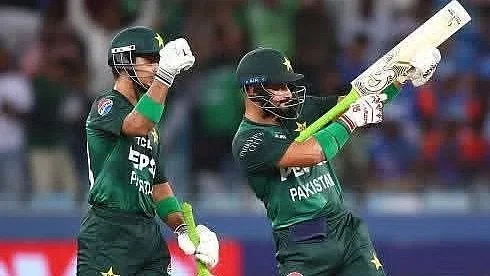Asia Cup: How cricket’s historic rivalry is in danger of boiling over in Dubai
Pakistan opener Shahibzada Farhan’s gesture could have fueled trouble in the stands

It’s a pity that on a day when Pakistan made a more determined start against holders India in their Super Four clash of Asia Cup, Sahibzada Farhan and experienced Haris Rauf grabbed the headlines for the wrong reasons. The ‘gun salute’ of the opener and the overtly aggressive gesture from the pace bowler could have resulted in sanctions from ICC Match Referee Andy Pycroft – and then the Zimbabwean would have been labelled pro-India again.
Let’s face it – such reckless acts on a cricket pitch were downright provocative and could have had a ripple effect on the 20,000-odd crowd at the Dubai International Stadium with a good mix of diaspora from both countries. The atmosphere in a India-Pakistan game there have been generally free of rancour but then, all it needs is a moment’s indiscretion to stoke the fire in the stands.
There are no prizes for guessing that the rush of blood on part of the Pakistani cricketers have been a direct fallout of the bad blood created over the past week – with the handshake row and Indian skipper and coach’s narrative to politicise their one-sided win a week back.
An ideal reply to that would have been to let the bat and the ball do the talking but what one saw was an act of anger and frustration being vented on the field.
Also Read: ‘Just not cricket,’ as the saying goes
The growing gulf of standard between the two arch rivals was there for all to see and Suryakumar Yadav rubbed it in when he said in the press conference that it was time for the media to stop harping on the rivalry theme.
‘’It is only a rivalry when it is 8-7 or something. But when it is 10-1 or 10-0 it is no longer a rivalry,’’ said the captain, whose calm head went a long way in reining in a largely young team in both matches.
The past week has seen, if truth be told, neither the Pakistan team nor it’s management cover itself with glory – and this is where the role of Mohsin Naqvi, the country’s Interior Minister who wears many a hat, owes an explanation.
It has seen the Pakistan Cricket Board (PCB) first complaining to the ICC for removing Pycroft from their games for not enforcing the captains’ handshake in the previous game, threatening a boycott of the UAE game which eventually started an hour late on apparent ‘threats’ of financial loss and finally – skipping two pre-match press conferences on the trot.
The leadership in the middle also left a lot to be deserved with captain Salman Ali Agha not seen taking an initiative to calm the nerves between his pace bowlers and the two openers – Shubman Gill and Abhishek Sharma on a rampage.
The Pakistan camp also showed a desperation of sorts when they engaged a motivational skipper, Dr Raheel Ahmed, with the team to help them tackle the stress midway in the tournament – which perhaps shows off where the chink in the armour lies.
The irony is there was a times in the early Nineties when India often struggled to find a winning formula against a much powerful Pakistan during their sojourn in Sharjah – prompting one of their greats to say that they needed psychiatric help.
While the former has moved on, Pakistan cricket is now in search of stability with a constant change of coaches, arbitrary selection policy and their former greats berating the team on TV chat shows.
Post Script: There is no denying that despite Surya’s assertion on the quality of rivalry on the basis of recent records, cricket’s biggest money-spinner game is in danger due to the overt attempts at politicisation and weak governance.
With another face-off between them quite a possibility in the final on 28 September, it now needs saner voices on both sides to keep a lid on the emotions.
Follow us on: Facebook, Twitter, Google News, Instagram
Join our official telegram channel (@nationalherald) and stay updated with the latest headlines
